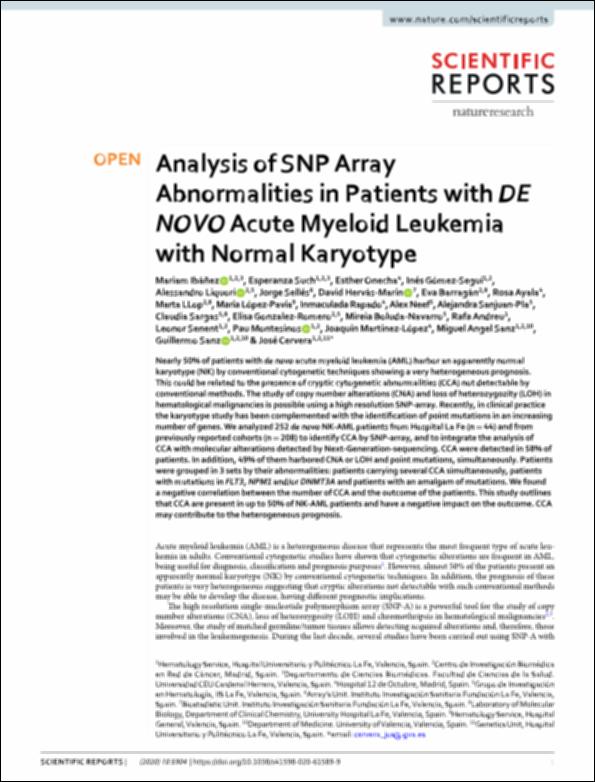Please use this identifier to cite or link to this item:
http://hdl.handle.net/10637/12780Analysis of SNP array abnormalities in patients with "DE NOVO" Acute Myeloid Leukemia with Normal Karyotype
| Title: | Analysis of SNP array abnormalities in patients with "DE NOVO" Acute Myeloid Leukemia with Normal Karyotype |
| Authors : | Ibáñez Company, Mariam Such Taboada, Esperanza Onecha de la Fuente, Esther Gómez Seguí, Inés Liquori, Alessandro Sellés Martínez, Jorge Juan |
| Keywords: | Macaques - Behavior.; Leucemia mieloide aguda.; Acute myeloid leukemia.; Citogenética.; Hematology.; Hematología.; Blood - Diseases - Genetic aspects.; Sangre - Enfermedades - Aspectos genéticos.; Cytogenetics. |
| Publisher: | Nature Research. |
| Citation: | Ibáñez, M., Such, E., Onecha, E., Gómez-Seguí, I., Liquori, A., Sellés, J. et al. (2020). Analysis of SNP array abnormalities in patients with DE NOVO Acute Myeloid Leukemia with Normal Karyotype. Scientific Reports, vol. 10, art. 5904 (03 apr.). DOI: https://doi.org/10.1038/s41598-020-61589-9 |
| Abstract: | Nearly 50% of patients with de novo acute myeloid leukemia (AML) harbor an apparently normal karyotype (NK) by conventional cytogenetic techniques showing a very heterogeneous prognosis. This could be related to the presence of cryptic cytogenetic abnormalities (CC A) not detectable by conventional methods. The study of copy number alterations (CNA) and loss of heterozygozity (LOH) in hematological malignancies is possible using a high resolution SNP-array. Recently, in clinical practice the karyotype study has been complemented with the identification of point mutations in an increasing number of genes. We analyzed 252 de novo NK-AML patients from Hospital La Fe (n = 44) and from previously reported cohorts (n = 208) to identify CCA by SNP-array, and to integrate the analysis of CCA with molecular alterations detected by Next-Generation-sequencing. CCA were detected in 58% of patients. In addition, 49% of them harbored CNA or LOH and point mutations, simultaneously. Patients were grouped in 3 sets by their abnormalities: patients carrying several CCA simultaneously, patients with mutations in FLT3, NPM1 and/or DNMT3A and patients with an amalgam of mutations. We found a negative correlation between the number of CCA and the outcome of the patients. This study outlines that CCA are present in up to 50% of NK-AML patients and have a negative impact on the outcome. CCA may contribute to the heterogeneous prognosis. |
| Description: | Este artículo se encuentra disponible en la siguiente URL: https://www.nature.com/articles/s41598-020-61589-9.pdf En este artículo también participan: David Hervás-Marín, Eva Barragán, Rosa Ayala, Marta LLop, María López-Pavía, Inmaculada Rapado, Alex Neef, Alejandra Sanjuan-Pla, Claudia Sargas, Elisa Gonzalez-Romero, Mireia Boluda-Navarro, Rafa Andreu, Leonor Senent, Pau Montesinos, Joaquín Martínez-López, Miguel Angel Sanz, Guillermo Sanz y José Cervera. |
| URI: | http://hdl.handle.net/10637/12780 |
| Rights : | http://creativecommons.org/licenses/by/4.0/deed.es |
| ISSN: | 2045-2322 (Electrónico). |
| Issue Date: | 3-Apr-2020 |
| Center : | Universidad Cardenal Herrera-CEU |
| Appears in Collections: | Dpto. Ciencias Biomédicas |
Items in DSpace are protected by copyright, with all rights reserved, unless otherwise indicated.


